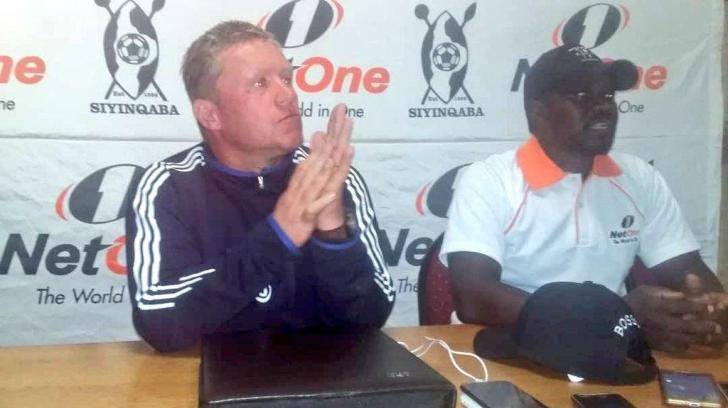Sports / Local
Highlanders gamble on return of 'The Dutch Nomad'
23 Aug 2025 at 08:16hrs |
19 Views

By
all accounts, Hendrik Pieter de Jongh is a man of many clubs and
fleeting commitments. Nicknamed "The Dutch Nomad," the Dutchman has
built a reputation for tactical flair and abrupt exits, leaving behind
both trophies and turmoil. Now, Highlanders FC have placed their future
in his hands once again - a move fraught with risk and uncertainty.
De Jongh's return to Bosso in July 2025 was as unconventional as his career has been. He turned up unannounced at a training session, introducing himself to players while the club rushed to finalise his paperwork. It was a reminder of the unpredictability that has defined his decades-long coaching journey across more than 20 clubs in Africa, Europe, and Asia.
His first stint at Highlanders in 2019 brought the Chibuku Super Cup and a respectable sixth-place finish in the league. Yet just as fans began to believe in a long-term project, he walked away to join FC Platinum, despite having promised Bosso a contract extension. That move fizzled when Caf regulations barred him from leading Platinum in the Champions League due to his lack of a Caf A Licence.
The Dutchman's CV resembles a travel log: Kenya, South Africa, Somalia, Hungary, Mongolia, Malawi — with tenures rarely lasting a year. At Malawi's Silver Strikers, he exited amid controversy and missed targets, echoing a pattern that has earned him as many critics as admirers.
Highlanders, meanwhile, are in crisis. The club is mid-table, struggling financially, and losing key players. In this fragile climate, De Jongh's presence is already stirring unrest. Last Sunday, still without a contract and seated in the terraces, he influenced team selection against TelOne. His insistence on starting veteran goalkeeper Ariel Sibanda backfired badly. Sibanda missed a penalty and conceded twice in a 0-2 loss that left fans fuming. Acting coach Try Ncube was left to face the cameras, his authority clearly undermined by De Jongh's shadow.
By midweek, De Jongh's grip on the team had tightened. Despite not yet being official, he suspended goalkeeper Reward Muza for missing training — a decision confirmed by chairman Kenneth Mhlophe but not publicly backed by Ncube. The message was clear: De Jongh, not Ncube, was in charge. With his work permit secured on Wednesday, the Dutchman has already promised new signings, including a Namibian talent, though critics doubt his staying power.
For Highlanders, the decision to rehire De Jongh is a gamble that could either revive the club or plunge it into deeper chaos. For De Jongh, it is a chance to rewrite his legacy. To do so, he must shed the nomadic instincts that have defined his career.
Highlanders are not just another stopover; they are a club with history, pride, and a restless fanbase that craves stability. If De Jongh truly wants to reward the faith Bosso has shown in bringing him back, he must commit — in action, not just in words.
This time, The Dutch Nomad must become The Dutch Settler.
De Jongh's return to Bosso in July 2025 was as unconventional as his career has been. He turned up unannounced at a training session, introducing himself to players while the club rushed to finalise his paperwork. It was a reminder of the unpredictability that has defined his decades-long coaching journey across more than 20 clubs in Africa, Europe, and Asia.
His first stint at Highlanders in 2019 brought the Chibuku Super Cup and a respectable sixth-place finish in the league. Yet just as fans began to believe in a long-term project, he walked away to join FC Platinum, despite having promised Bosso a contract extension. That move fizzled when Caf regulations barred him from leading Platinum in the Champions League due to his lack of a Caf A Licence.
The Dutchman's CV resembles a travel log: Kenya, South Africa, Somalia, Hungary, Mongolia, Malawi — with tenures rarely lasting a year. At Malawi's Silver Strikers, he exited amid controversy and missed targets, echoing a pattern that has earned him as many critics as admirers.
Highlanders, meanwhile, are in crisis. The club is mid-table, struggling financially, and losing key players. In this fragile climate, De Jongh's presence is already stirring unrest. Last Sunday, still without a contract and seated in the terraces, he influenced team selection against TelOne. His insistence on starting veteran goalkeeper Ariel Sibanda backfired badly. Sibanda missed a penalty and conceded twice in a 0-2 loss that left fans fuming. Acting coach Try Ncube was left to face the cameras, his authority clearly undermined by De Jongh's shadow.
By midweek, De Jongh's grip on the team had tightened. Despite not yet being official, he suspended goalkeeper Reward Muza for missing training — a decision confirmed by chairman Kenneth Mhlophe but not publicly backed by Ncube. The message was clear: De Jongh, not Ncube, was in charge. With his work permit secured on Wednesday, the Dutchman has already promised new signings, including a Namibian talent, though critics doubt his staying power.
For Highlanders, the decision to rehire De Jongh is a gamble that could either revive the club or plunge it into deeper chaos. For De Jongh, it is a chance to rewrite his legacy. To do so, he must shed the nomadic instincts that have defined his career.
Highlanders are not just another stopover; they are a club with history, pride, and a restless fanbase that craves stability. If De Jongh truly wants to reward the faith Bosso has shown in bringing him back, he must commit — in action, not just in words.
This time, The Dutch Nomad must become The Dutch Settler.
Source - The Chronicle
Join the discussion
Loading comments…



























